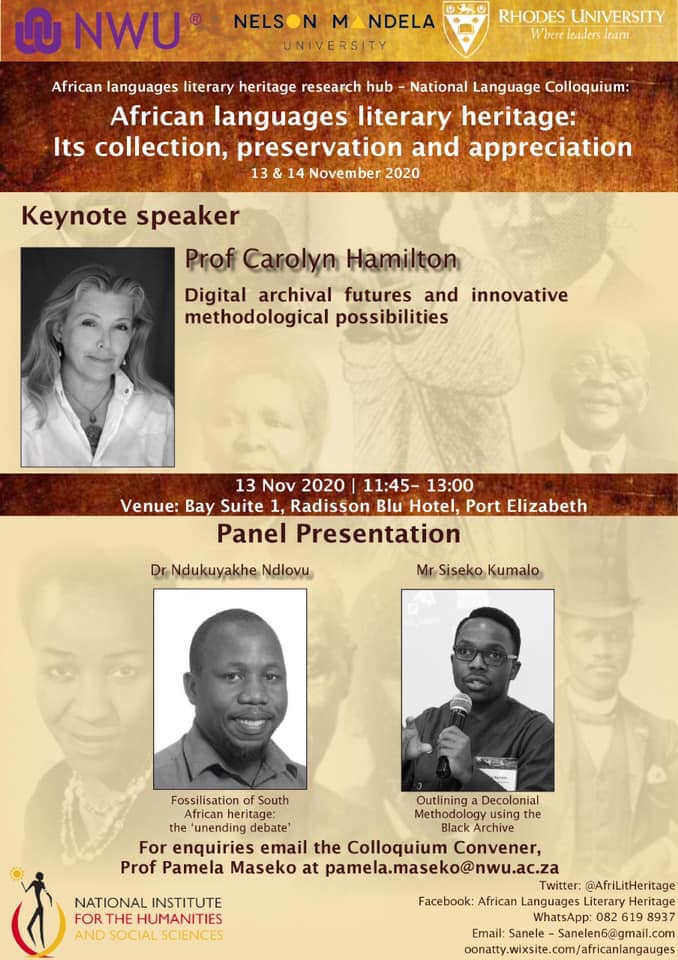Filling the ‘epistemic vacuum’ in African languages heritage

Susana Molins Lliteras
The African Languages Literary Heritage Research Hub (ALLHerRes-Hub), one of the Humanities Hubs of the National Institute for the Humanities and Social Sciences (NIHSS, https://nihss.ac.za/content/humanities-hubs) held its National Language Colloquium entitled “African Languages Literary Heritage: Its Collection, Preservation and Appreciation”, from 13 to 14 November 2020 at the Radisson Blu Hotel in Port Elizabeth. The colloquium had to be postponed because of the Covid-19 crisis and was finally held as a combination of physically present and online participation, making it a pioneer experience in that regard. The ALLHerRes-Hub is led by Professor Pamela Maseko, currently Executive Dean of Humanities at North West University and a leader in the study of literary heritage in isiXhosa, and functions in collaboration with Rhodes and Nelson Mandela universities. One if its central aims is to collect, document, publish and translate into English early writings in African languages, focussing on isiXhosa (1820-1950).
The colloquium addressed one of the core research interests of the APC and had a strong presence of APC-affiliated participants, including APC’s PhD student Sanele Ntshingana as part of the organising committee. It was structured around six themes, each offering a central keynote address and shorter panel presentations. Professor Maseko opened the proceedings with an official welcome and a presentation of the project, introducing their main research output, the impressive eight-volume Opland Collection of Xhosa Literature, which presents the writings of various early African intellectuals in isiXhosa, as they appeared in the newspapers at the time, and with an annotated English translation (https://www.ukznpress.co.za/?class=bb_ukzn_books&method=view_books&global%5Bfields%5D%5B_id%5D=460).
The first theme was “Benefits and Burdens of the Past: Dreams and Nightmares”, and one of the great pioneers of the field, Dr Nomathamsanqa Tisani, gave the keynote address, entitled “Re-membering, Celebrating, Honouring and Preserving Literary Heritage Archive for Posterity”. Dr Tisani made a powerful plea for the necessity to go beyond the “grand narrative” of orality versus written culture, and to understand the interactions between the knowledge producers based at the mission stations and those beyond them. The highlight of theme two, “Identifying, Conserving and Revitalising the Past” was the APC’s Professor Carolyn Hamilton’s keynote address, “Digital Archival Futures and Innovative Methodological Possibilities”, Professor Hamilton focused on the “discursive archive”, the work that words do in sentences and what they tell us about “ways of thinking” as well as “thinking realised through doing” or political praxis.
The afternoon session, titled “Archives and Inclusivity: Locating Marginalised Voices in the Archive”, began with a strong intervention by APC’s Guest Scholar, Dr Athambile Masola, entitled “Ukuzilanda, Ukubonwa Nokungabonwa kweHeritage Yamakhosikazi: Excavating Victoria Swaartbooi’s UMandisa”. Dr Masola proposed ukuzilanda as conceptual framework and praxis, offering a close reading of the novel UMandisa together with an analysis of its reviews from The Bantu World, to counter the marginalisation and erasure of women’s intellectual histories and narratives. Her discussant, APC’s MA student Precious Bikitsha, raised important issues to do with the possibilities of genre (fiction versus poetry) drawing on her own work on Nontsizi Mgqwetho.
The last theme of the day, “Challenges and prospects in preserving the literary heritage”, gathered in one session a diverse group of presenters, from academics and heritage practitioners such as Dr Sibongile Masuku to artist Athi Patra Ruga, reflecting on his practice (Victory of the Word at Lovedale), a schoolteacher, Gwynneth Thompson, introducing a heritage initiative based at a school, and a priest, the Reverend Johannes Stuurman, reflecting on family and mission heritage in Kuruman at the Moffat Mission Station. The session ended with a presentation by APC’s Post-Doctoral Fellow, Dr Susana Molins-Lliteras, “Preserving the Manuscript Heritage of Timbuktu: Experiences and Lessons”, which highlighted the contested role of foreign donors and foundations, issues to do with conservation, digital preservation and evolving technology, questions of access and sustainability of institutions, and concerns about intellectual rights and cultural heritage.
Day two of the colloquium began with the theme “The Role of the Archive in the Diversification of the Canon in the Academy”. The stimulating panel consisted of Professor Zethu Cakatha, who highlighted the roles of names as archive, and two students, Zikho Dana and Zimi Sigenu, presenting their respective research projects: the former on the use of translanguaging strategies in tutorials or lectures and the latter on sociologically significant concepts informed by local sociocultural experiences. Professor Nomalanga Mkhize brought the colloquium to a close with a powerful talk entitled “The Future of the archive in South Africa.”
Professor Mkhize argued that the answer to the “epistemic vacuum” in the South African humanities lies in the “black archive”, which offers an umbilical cord and is an alternative to theory from the black Atlantic or the Global South. She made an impassioned plea for the necessity to “mainstream” the black archive by training enough students with the necessary linguistic and academic capabilities needed to do this kind of painstaking work.
The colloquium was in itself a reflection of the possibilities that emerge when researching the “black archive” and the early literary heritage in African languages and it was heartening to see the number of students, scholars and people outside academia engaging with this archive. Notably, other initiatives, such as the APC, are also contributing significantly to the emergence of a new cohorts of scholars who engage with this archive in creative and innovative ways — and will lead the way in future research.

Poster for the "African Languages Literary Heritage: Its Collection, Preservation and Appreciation” Colloquium